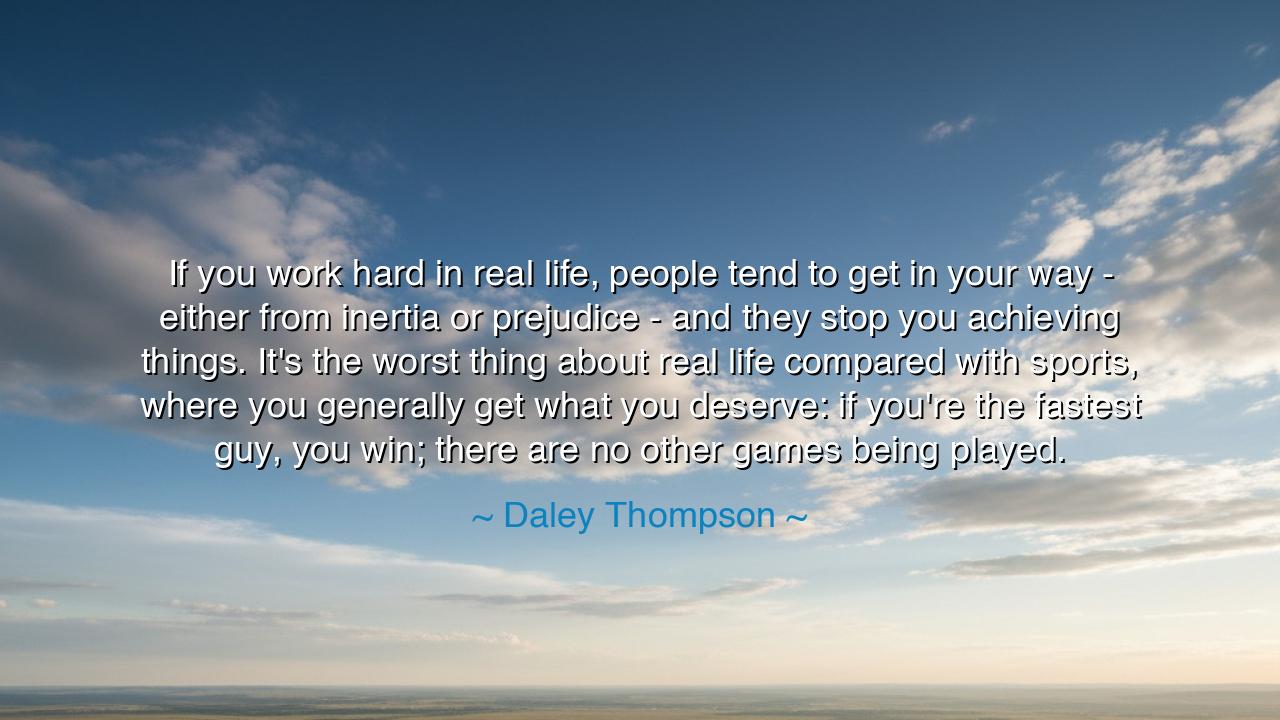
If you work hard in real life, people tend to get in your way -
If you work hard in real life, people tend to get in your way - either from inertia or prejudice - and they stop you achieving things. It's the worst thing about real life compared with sports, where you generally get what you deserve: if you're the fastest guy, you win; there are no other games being played.






Hear the words of Daley Thompson, the great decathlete, who bore the weight of ten disciplines upon his shoulders and emerged victorious. He said: “If you work hard in real life, people tend to get in your way—either from inertia or prejudice—and they stop you achieving things. It’s the worst thing about real life compared with sports, where you generally get what you deserve: if you’re the fastest guy, you win; there are no other games being played.” Within these words lies both lament and truth, a contrast between the pure arena of athletics and the tangled webs of ordinary existence.
When he speaks of work hard, he acknowledges the noble effort of human striving, the burning of energy, the sacrifice of body and spirit in pursuit of achievement. In sports, this effort is rewarded with clarity. The finish line does not lie, the clock does not deceive, the field does not play politics. The swiftest runner crosses first, the strongest man lifts the heaviest weight, and glory follows the one whose body and will are most disciplined. This is the fairness of the arena, the justice of measurable performance.
But when Thompson turns to real life, he grieves the crookedness of human systems. There, he says, even the diligent may be thwarted. Inertia—the dead weight of institutions unwilling to change—slows the progress of the deserving. Prejudice—the poisoned eyes of those who judge by skin, by class, by gender, by station—bars the path of the worthy. In life, merit does not always shine; often it is dimmed by the shadows of envy, fear, or indifference.
History bears witness to his sorrow. Think of Galileo, who with telescope in hand proved truths about the heavens, yet was silenced by the inertia of a Church unwilling to yield its old dominion. Or Jackie Robinson, who was fast enough, skilled enough, and brave enough to play America’s game, yet endured the scorn of prejudice before his greatness could be fully acknowledged. Both men labored as athletes in their own realms, yet their victories were slowed by forces beyond the purity of effort and skill.
The deeper meaning of Thompson’s words is this: the world of sports offers us a vision of what life could be if it were stripped of duplicity. It shows us a model of justice—where talent, preparation, and endurance are crowned, and nothing else. It reminds us that humans hunger for fairness, for a realm where no secret intrigues undermine effort, where the race is decided by strength and will alone. Yet life outside the arena rarely mirrors this, and therein lies the wound.
But Thompson does not speak only in despair; hidden within his words is a challenge. If real life is crooked, let us bend it back toward fairness. If prejudice blocks the worthy, let us dismantle it. If inertia freezes change, let us press forward with new strength. For though life may never match the purity of sport, we may carry into it the principles of sport: discipline, fairness, courage, and the respect of merit.
The lesson for us is clear: in your daily struggles, do not expect the world to always reward you justly. Yet let this not breed bitterness. Instead, continue to work hard with the honesty of an athlete, knowing that even if others block your path, your discipline and integrity will carve another way. Seek not only to win for yourself, but to change the game for others, so that prejudice and inertia are lessened for the next generation.
The practical action is this: live by the code of the arena. Honor merit wherever you see it, whether in yourself or others. Do not play the “other games” of deceit, favoritism, or oppression. When you are in positions of power, reward effort and truth, as the stopwatch rewards the runner. And in your own heart, remember that even when victory in real life is denied, the true triumph is to remain upright, steadfast, and worthy—like the athlete whose feet never stray from the track of honor.
Thus, Daley Thompson’s words endure as both complaint and compass. He reminds us that life is not as fair as the field of sport—but he also shows us that sport gives us a glimpse of justice, a vision of what humanity might become if it learns to honor effort and courage above all else.






AAdministratorAdministrator
Welcome, honored guests. Please leave a comment, we will respond soon